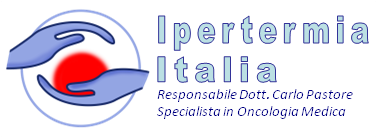Modelli per la valutazione della ipertermia
 Questo articolo tratta dell'approccio multimodale alla problematica oncologica impiegando anche ipertermia oncologica.
Questo articolo tratta dell'approccio multimodale alla problematica oncologica impiegando anche ipertermia oncologica.
Dr. Carlo Pastore
J R Soc Interface. 2013 Aug 28;10(88):20130527. doi: 10.1098/rsif.2013.0527. Print 2013 Nov 6.
Modelling the efficacy of hyperthermia treatment.
Rybinski M1, Szymanska Z, Lasota S, Gambin A.
Author information
Abstract
Multimodal oncological strategies which combine chemotherapy or radiotherapy with hyperthermia, have a potential of improving the efficacy of the non-surgical methods of cancer treatment. Hyperthermia engages the heat-shock response (HSR) mechanism, the main component of which are heat-shock proteins. Cancer cells have already partially activated HSR, thereby hyperthermia may be more toxic to them relative to normal cells. On the other hand, HSR triggers thermotolerance, i.e. hyperthermia-treated cells show an impairment in their susceptibility to a subsequent heat-induced stress. This poses questions about efficacy and optimal strategy for anti-cancer therapy combined with hyperthermia treatment. To address these questions, we adapt our previous HSR model and propose its stochastic extension. We formalize the notion of a HSP-induced thermotolerance. Next, we estimate the intensity and the duration of the thermotolerance. Finally, we quantify the effect of a multimodal therapybased on hyperthermia and a cytotoxic effect of bortezomib, a clinically approved proteasome inhibitor. Consequently, we propose an optimal strategy for combining hyperthermia and proteasome inhibition modalities. In summary, by a mathematical analysis of HSR, we are able to support the common belief that the combination of cancer treatment strategies increases therapy efficacy.

 RSS
RSS 





